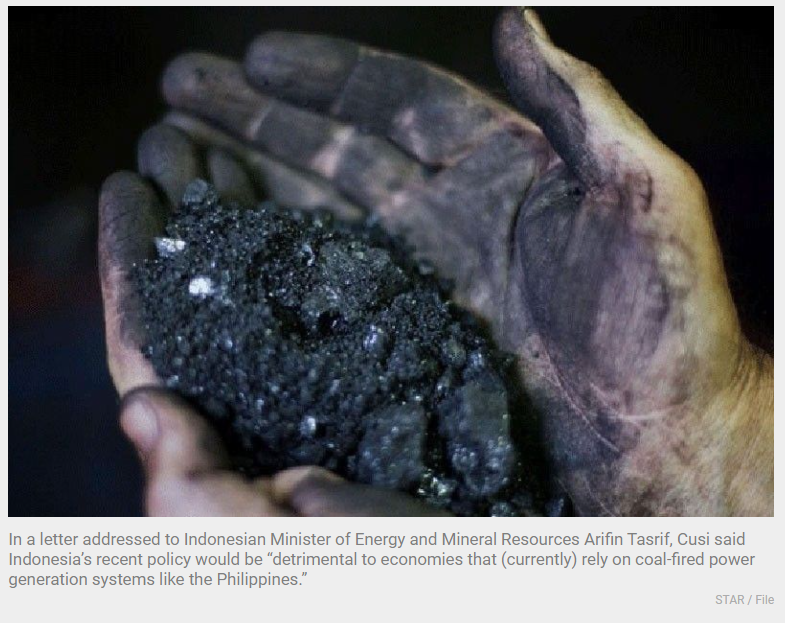Cusi urges Indonesia to lift coal export ban
MANILA, Philippines — Energy Secretary Alfonso Cusi is urging Indonesia to lift its coal export ban, as the Philippines heavily sources its coal imports from the fellow Southeast Asian country.
In a letter addressed to Indonesian Minister of Energy and Mineral Resources Arifin Tasrif, Cusi said Indonesia’s recent policy would be “detrimental to economies that (currently) rely on coal-fired power generation systems like the Philippines.”
Cusi cited the healthy economic cooperation between the Philippines and Indonesia.
Last month, the Indonesian Directorate-General of Mineral and Coal announced the ban for the entire month of January to avert a looming power crisis in Indonesia.
In 2021 alone, the Philippines sourced 2.3 million metric tons monthly from Indonesia to fuel coal-fired power plants.
“Power generated from coal comprises about 60 percent of the country’s power demand,” Cusi said.
To mitigate the impact of the ban, the Department of Energy (DOE)’s Electric Power Industry Management and Energy Resource Development Bureaus are scheduled to meet with the country’s coal power plant generators to discuss potential strategies and the way forward.
“We are going to meet with the coal plant operators. We’re also banking on our relationship with Indonesia. We’re not after the entire coal supply of Indonesia,” DOE Undersecretary Felix William Fuentebella said in a virtual briefing yesterday.
The country’s largest power distributor Manila Electric Co. (Meralco) said it has three main power suppliers that may be affected by the coal ban.
These are the 455-megawatt San Buenaventura Power Ltd. (SBPL) plant, the 460-MW Quezon Power Philippines Ltd. Co. plant, and the Panay Energy Development Corp. plant, which covers Meralco with 70 MW of baseload supply.
“But according to our suppliers, we have sufficient supply of coal for more than two months. They have advised us that they are also waiting for the outcome of discussions between the Indonesian government and the Indonesian coal miners’ association on how to address the export ban. At least in the next couple of months, there will be no supply disruption since we have sufficient fuel supply,” Meralco vice president and head of utility economics department Lawrence Fernandez said in a virtual briefing yesterday.
SBPL is on its annual maintenance program, meaning it is not currently running and supplying power to Meralco, Fernandez said.
On top of the existing two-month coal supply of generators, Fernandez said the country still has other sources of coal to avoid any disruption in power supply.
“While the Philippines has been historically sourcing the majority of its coal supply from Indonesia, there are actually other countries that can provide coal to the country, such as Australia, although this will really depend on our suppliers’ own sourcing portfolio for fuel. But we don’t think it will lead to any disruption of fuel provision to the Philippines since we can get supply from other countries,” Fernandez said.
However, there is no assurance that the pricing of coal from other sources will be the same with that of Indonesian coal.
Last week, Sen. Sherwin Gatchalian urged the DOE to prepare contingency measures to ensure sufficient coal supply and avert possible higher coal prices.
This, as the coal export ban has caused concerns on the country’s supply of coal for power plants, which, if insufficient, could lead to widespread blackouts.
“Part of the contingency measures should be to ensure the adherence of coal-fired power plants to the 30-day minimum inventory requirement,” Gatchalian said.
“The government should also consider looking for other suppliers especially in the coming weeks given the possible decline in stockpiles coming from Indonesia, which could result in soaring coal prices,” he said.
Gatchalian said Indonesia is the biggest supplier of coal in the country, which got more than half of its electricity supply from coal-fired power plants at 57.17 percent in 2020.
As of October last year, the Philippines acquired 96.88 percent of imported coal supply from Indonesia, 1.82 percent from Australia, 0.35 percent from Vietnam, and 0.94 percent from other exporting countries.
Of the total 42.476 million metric tons of coal produced and imported in 2020, 69.51 percent of which were imported, while 30.49 percent came from local sources.
Meanwhile, consumer rights and energy advocacy group Power for People Coalition (P4P) also raised concern over power stability in the Philippines following the month-long coal export ban of Indonesia.
“We need to get off reliance on global fossil fuel supply – coal or otherwise – fast. We have repeatedly told the DOE this, and we hope Indonesia’s predicament is now making the message clear. We must begin by putting a stop to any new coal plant still in our pipeline,” P4P convenor Gerry Arances said.
In light of this situation, P4P demanded the DOE to stop exposing Filipinos to risks of worse power woes by also banning the building of all new coal plants and rapidly displacing the dirty fossil fuel with renewable energy.
In October 2020, the DOE announced a moratorium on new coal-fired power plants but indicated exemptions and limitations in its guidelines, making room for an additional coal capacity of about nine gigawatts.
“Consumers keep getting caught in a web of power stability woes and volatile prices all because we depend on a finite and largely imported energy source. As we wait for implications of Indonesia’s export ban to be reflected on our monthly bills just like last year’s energy crunch did, we can already be sure that more of such will happen in the future for as long as we insist on using fossil fuels, even as our country’s vast indigenous renewable energy capacity waits to be harnessed,” Arances said.
In 2016, the Philippines experienced a similar ban on coal exports from Indonesia.
Indonesia imposed a moratorium on any Indonesian-flagged vessel to sail to the Philippines following the kidnapping by Abu Sayyaf bandits of several Indonesian sailors on board a coal tugboat in the Sulu Sea. The ban also covered vessels containing coal shipments.
Source: https://www.philstar.com/business/2022/01/11/2153035/cusi-urges-indonesia-lift-coal-export-ban


 Thailand
Thailand




